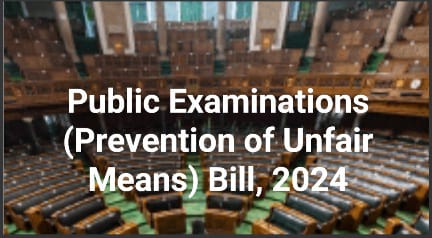Budget Session : Lok Sabha on Tuesday passed ‘The Public Examinations (Prevention of Unfair Means) Bill, 2024’ aimed at curbing leaks, malpractices as well as organised malpractices in recruitment examinations like UPSC, SSC etc and entrance tests such as NEET, JEE, and CUET.
“Prevention of Unfair Means Bill, 2024” will also cover entrance examinations held by the Union Public Service Commission, the Staff Selection Commission, the Railways, banking recruitment examinations and all computer-based examinations conducted by the National Testing Agency.
Earlier, Initiating discussion over the bill in parliament, Union Minister Dr Jitendra Singh said, one after another we have witnessed incidents of malpractices, paper leak, impersonation etc from various parts of the country. In Rajasthan, there have been 12 incidents of malpractices since 2018 while the Sub-Inspector Recruitment scam surfaced in Jammu & Kashmir in March, 2022 and SSC Combined Graduate Exam in 2017, he said.
“There are several instances but prominently, in West Bengal, the Diploma in Elementary Education paper in November, 2022 was leaked, again in the same state in February, 2023 English paper leaked besides School Service Commission, West Bengal also leaked. In December, 2022 Teacher Recruitment Scam unravelled in Rajasthan while in February, 2022 the Rajasthan Eligibility Exam for Teachers was also plagued by malpractices and the exam had to re-conducted. In May, 2022 Rajasthan Police Constable Recruitment Exam was hit by a scam,” he said.
Dr Jitendra Singh said, the Public Examinations (Prevention of Unfair Means) Bill is dedicated to the strength and capabilities of the Youth. The Youth and the Women are representative of the two sections that are a priority of the Government headed by Prime Minister Narendra Modi. PM Modi has said, we are aware of only four classes, – Youth, Women, Kisan or Annadaata and the Poor.
Dr Jitendra Singh clarified that the students or the candidates appearing in these examinations have been kept out of the purview of Bill and assured that they will continue to be governed as per provisions of the agencies conducting the exams.
The Bill proposes a punishment of a minimum of three to five years of imprisonment to curb cheating and for those involved in organised crimes of cheating will face five to 10 years of imprisonment and a minimum fine of Rs 1 crore.
The Bill is aimed at preventing organised gangs and institutions that are involved in unfair means for monetary gains, but it protects candidates from its provisions.

